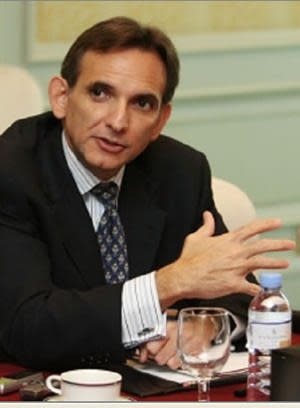 The Envoy
The EnvoyEnergy diplomacy: State launches energy bureau, with eye on volatile energy markets, impact on US economy

With rising tensions over Iran threatening to spike oil prices, and ongoing efforts to bring post-war Iraq and Libya oil production back online, the State Department launched a new Bureau of Energy Resources this month.
The impetus for the new 50-person bureau dates back to 2009, when Secretary of State Hillary Clinton "asked people in the Department … to look out 25 years and ask the question: What kinds of changes do we need to make in order to protect American national security?" Carlos Pascual, the former U.S. ambassador to Mexico and Ukraine and acting head of the bureau, told journalists in a State Department telephone briefing this month. "And one of the core issues that came back is that we needed to focus greater attention on our capacity to address energy security concerns for the United States because it has become so central to our national security and our economic prosperity."
The White House is expected to formally announce Pascual's nomination to be assistant secretary of the bureau shortly.
Aiding Pascual in the new bureau is Deputy Assistant Secretary of State for Energy Security Amos Hochstein, a former House Foreign Affairs Committee staffer and campaign aide to Senators Mark Warner (D-VA) and Chris Dodd (D-Conn) who has worked extensively on the Middle East, Africa and South Asia.
Pascual, Hochstein and Deputy Energy Secretary Dan Ponneman traveled this month to Iraq. Among the issues on the radar there is Exxon Mobil's controversial decision to sign an oil deal with the Kurdish provincial government--bypassing the Iraqi central government and potentially jeopardizing future oil contracts in the rest of the country.
The energy resources bureau seeks "to manage the geopolitics of today's energy economy through vigorous diplomacy, " to try to "ensure affordable supplies of energy and to keep energy markets stable," Pascual said. It also aims to to stimulate market forces to increase access to energy for the world's poor, and promote green energy technology, he added.
There is, of course, a more immediate gauge of the bureau's relative success: the price of a barrel of oil. Or as Pascual--who himself rides his bike to work--put it in frank diplomatese, "global markets."
"While it's important for the United States to look at the . . . environmentally sustainable development of our resources, both oil and gas, and we have been doing that very seriously . . . we can't de-link ourselves from these global markets," Pascual said. "We have to recognize that growing demand from other countries is still going to affect prices, and we need to continue the kind of diplomacy with producers—key producers like Saudi Arabia and Russia, because they will always keep affecting those markets, even if we have greater supplies here in the United States."
Other popular Yahoo! News stories:
• Republican strategists, on private call, caution against attacking Obama: Yahoo exclusive
• Cyber experts, Pentagon skeptical Iran brought down lost U.S. spy drone
• Jobless in Iowa: a third of Iowa's unemployed looking for work for more than six months
Want more of our best national security stories? Visit The Envoy or connect with us on Facebook and on Twitter. Want more politics? Visit The Ticket or connect with us on Facebook and follow us on Twitter.
